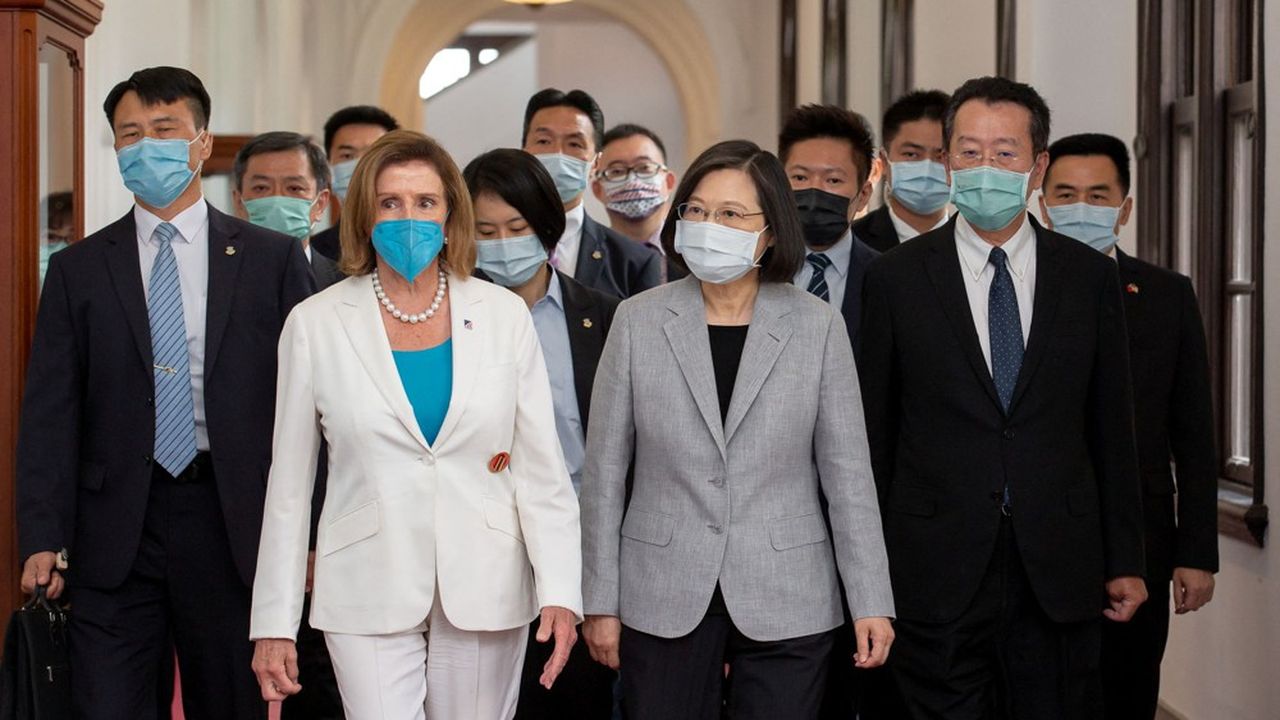The Stock Exchanges are in turmoil, the chancelleries on the alert, the military staffs more than ever on deck. But global tech has also been on high alert since Nancy Pelosi, the top US lawmaker and the third-largest federal state official, arrived in Taiwan on Tuesday – the highest visit by a US official in 25 years. The 82-year-old Speaker’s stay on the democratic and de facto autonomous island – but claimed by Beijing – immediately exacerbated tensions between China and the United States on tech, which have already been very strong since Donald Trump’s mandate. to the White House.
The Democrat’s agenda, it is true, left little doubt. After her political talks with the president, Tsai Ing-wen, and human rights activists, Nancy Pelosi took advantage of her high-profile stay to show her support for Taiwanese tech. On Wednesday, the patron saint of American parliamentarians met Mark Liu, president of TSMC, the biggest “founder” on the planet.
A far from trivial choice, given the strategic importance of this player for the global economy. In its factories in Hsinchu, near the capital Taipei, the Taiwanese giant manufactures almost 50% of the globe’s semiconductors, for American (Qualcomm, Apple) as well as Chinese (Huawei) and European customers.
A coveted giant
For years, TSMC’s technological advance on these archi-critical components for a myriad of sectors of the economy has made the group coveted by both the United States and China. In this match, however, Washington has already scored a point: in mid-2020, TSMC agreed to build a $12 billion factory in Arizona, its second in the country.
A victory for the United States, which wants to boost its industrial capacities in semiconductors, in particular via a 52 billion dollar plan just voted by Congress. According to the American SIA (Semi-conductors Industry Association), the sector lobby, the share of the United States in the world production of chips has fallen, it is true, from 37% to 12% in thirty years, largely to the benefit of Asia and Taiwan, which has become the global hub for this industry.
But TSMC can hardly turn its back on China, which is also gaining momentum in chip production. The group generates 10% of its turnover there and has two factories in the country. On Sunday, as tensions mounted, Mark Liu was clear. “No one can control TSMC by force,” the boss explained in a rare interview with CNN. If ever China were to invade Taiwan, TSMC’s factories would be inoperable as they are integrated into a global supply chain. And in turn, “this would create enormous economic turbulence in China, as their supplies of the most sophisticated components would disappear. »
Sanctions
Despite its anger at Pelosi’s visit, China can indeed hardly sanction TSMC, as the world’s second largest economy is so dependent on Taiwan and the rest of the world for its semiconductors, its chip imports exceeding its purchases of oil. Beijing has certainly imposed sanctions, but on less strategic sectors: a hundred Taiwanese food companies were placed on a blacklist this week, and China has at the same time interrupted its sand exports (for the production of glass and cement) to Taiwan.
On the other hand, China’s CATL, the world’s largest maker of batteries for electric cars, has already put its $5 billion factory project in North America on hold, according to Bloomberg. However, this factory would have made it possible to supply Tesla and Ford. Given the current tensions, CATL should finalize the choice of site (potentially in Mexico or the United States) in the fall, although an announcement was nevertheless planned in the coming weeks.
The United States continues to prevent China’s rise in semiconductors. Thus, companies benefiting from public subsidies under the Chips Act will be strictly prohibited from developing the production of advanced chips in China for ten years. The decision should affect Intel and its Chinese factory in Chengdu, as well as TSMC. But this ban also forces Korean giants like Samsung and SK Hynix to rethink their Chinese strategy, according to the “Financial Times”. With the tensions around Taiwan but also the strict policy of “zero Covid” in China, the South Koreans are increasingly pivoting towards the United States, like Samsung which announced last year a factory of $17 billion in Texas.
–

